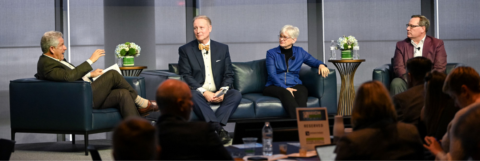View session recording below.
Following the UAW strike, the automotive and mobility industry is coming off an extremely contentious period. Anderson Economic Group’s Patrick L. Anderson, Cox Automotive’s Michelle Krebs, and S&P Global Mobility Consultants’ Michael Robinet discussed the industry’s post-strike future with ‘JR Morning’s Guy Gordon.
Strike Came with Hefty Price Tag, Slammed Suppliers
Before the industry can move forward, it must assess the impact and lessons learned from the strike. Anderson explained the stoppage came at a hefty price tag: About $6 billion lost with over 56,000 employees who were striking or laid off, according to his company’s analysis. He also stressed that suppliers have been affected the most, which, along with the UAW’s strategy, are the major differences between the 2023 and 2019 strikes.
“It’s extremely expensive, and you can see it now … in income tax decline,” said Anderson. “You can see in retail sales decline in Michigan, and at least if I look at this … with some interpretation of Chrysler, they’ve already acknowledged about $3.5 billion in losses. And I think by the end of the year … [that’ll] probably be larger.”
With Many Customers Priced Out, Auto Companies Will Struggle to Make Up Losses
Traditionally, companies can make up lost costs by simply raising their product volume and overall prices. However, Krebs predicted that it will not be that simple for the Detroit Three since, economically, consumers are “in the ditch.” She warned that automakers need to be “careful.”
“We think that affordability of vehicles is going to be a huge limitation. In terms of higher sales, it’s already a big issue,” she said. “We think that about 10% of people that normally are buying the cars have dropped out of the market already because they can’t afford it. So, I don’t know where they make up (the losses) because it’s certainly not going to be setting on much higher prices.”
“Scorched Earth” Strike Rhetoric Hurts Detroit Three, U.S. Production Outlook
During the conversation, the group agreed that the UAW’s past and planned rhetoric for the southern regions will hurt current and future companies looking to do business in the U.S., especially if they are a Detroit Three company. Therefore, Robinet advised those spreading rhetoric to think about the big picture when selecting their words.
“Let’s say you’re one of the [Detroit Three], and you got a new product that you want to build. Why on Earth would you consider building it in the United States when you’re going to have to deal with this sort of animosity?” Robinet asked. “Why don’t you look at Mexico or Canada or some other strategy? I think what they’ve done is essentially … scorched Earth. It has changed the dynamic, in my opinion.”
This session was sponsored by the Michigan Economic Development Corporation Office of Future Mobility and Electrification.

